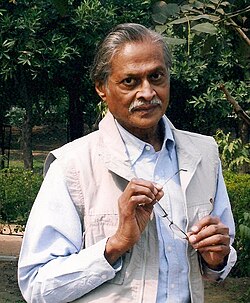This article has multiple issues. Please help improve it or discuss these issues on the talk page . (Learn how and when to remove these messages)
|
Jagannath Prasad Das | |
|---|---|
 Jagannath Prasad Das | |
| Born | 26 April 1936 Puri, Orissa Province, British India |
| Pen name | J.P., J.P.Das |
| Language | Odia, English |
| Nationality | Indian |
| Alma mater | Utkal University (1953–55), Allahabad University (1955–57) |
| Period | 1960s |
| Genre | Poetry, short Stories, plays, novels, essays, art history, translation |
| Notable works | English: Puri Paintings, Odia: Prathama Purusha, Parikrama, Desha Kala Patra, Suryasta Purbaru |
Jagannath Prasad Das (born 26 April 1936) is an Indian writer, poet, painter, playwright and novelist who writes in Odia.
Contents
- Life
- Translations and Editing
- Fellowships
- Awards
- Books by J P Das in Odia
- Odia poetry
- Odia Short Stories
- Odia plays
- Odia novel
- Children's literature (Odia)/nonsense rhymes
- Translation into Odia
- Anthologies of Poetry and Short Stories in Odia
- Books by J P Das in English
- Research works
- Essays
- Works edited
- Works translated
- Books by Das translated into English
- Short stories
- Plays
- Novel
- Collections of his works by others
- Books on J P Das
- References
- Videos